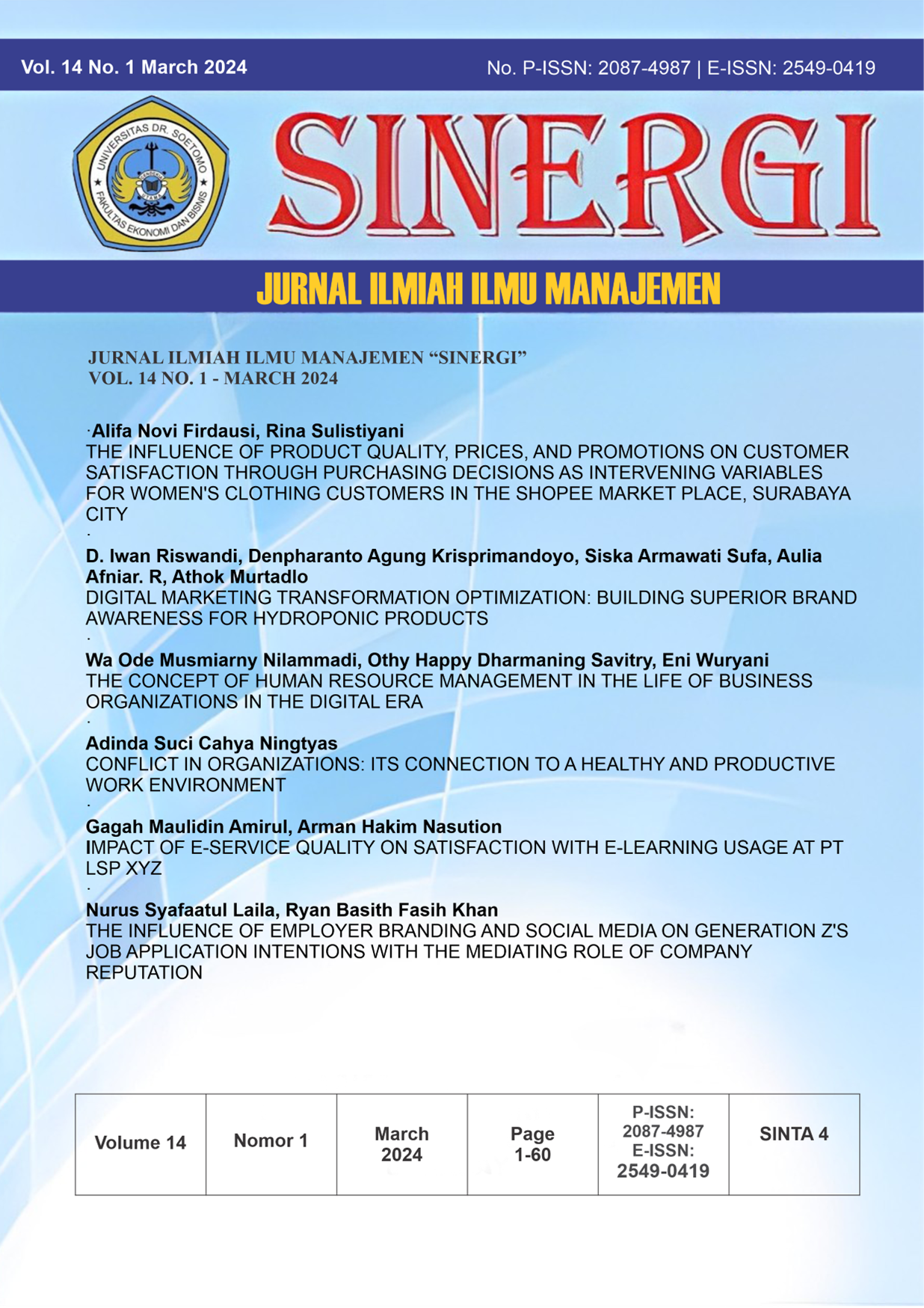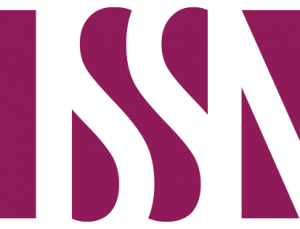CONFLICT IN ORGANIZATIONS: ITS CONNECTION TO A HEALTHY AND PRODUCTIVE WORK ENVIRONMENT
 Abstract views: 335
,
Abstract views: 335
,
 PDF Journal downloads: 369
PDF Journal downloads: 369
Abstract
In this day and age, conflict is a topic that is still being discussed. Conflict cannot be completely avoided in an organization, but it can be managed by minimizing it. The study employed a qualitative approach using systematic literature review methods to analyze and synthesize existing research on organizational conflict and its implications for healthy and productive work environments. Data collection involved reviewing 30 articles from reputable national and international journals, focusing on conflict management, leadership styles, and the impact of external factors on organizational dynamics. Effective conflict management by organizational leaders is essential in fostering a cooperative environment for handling conflicts within teams. Constructive conflict management can lead to positive changes and learning experiences for all parties involved in organizational conflicts. Effective conflict resolution strategies can stimulate innovative problem-solving among employees and prevent a decline in motivation and creativity due to high levels of conflict.
References
De Dreu CKW, W. L. (2003). Task Versus Relationship Conflict, Team Performance, and Team Member Satisfaction: A Meta Analysis. Journal of Applied Psychology, 88(4), 741–749.
Diani, M. (2017). The concept of social movement. Civil Societies and Social Movements: Domestic, Transnational, Global, 129–153. https://doi.org/10.4324/9781315260143-15
Dinna Riana, V. Y. A. (2016). Pengaruh Konflik Kerja, Stres Kerja, dan Lingkungan Kerja Terhadap Karyawan Perusahaan Kantong Plastik Keris Surakarta. Bhirawa, 3(1), 1–8.
Donate, M.J., Guadamillas, F., & González-Mohíno, M. (2023). Solving Task Management Conflict In Hotel Establishments Through Knowledge Management Tools: Effects On Innovation Capabilities. J. Knowl. Manag., 27, 157-186.
Fatihaturahmi, M. Giatman, E. (2023). Study Literature Peran Manajemen Konflik dan Cara Penanganan Konflik dalam Organisasi Sekolah. Journal of Education Research, Vol. 4(No. 3), Hal. 1075-1081. Retrieved from https://jer.or.id/index.php/jer/article/view/277%0Ahttps://jer.or.id/index.php/jer/article/download/277/231
Hanna, S. (2022). Theories of Social Movements. International Journal of Engineering Research in Computer Science and Engineering, 9(7), 1–3. https://doi.org/10.36647/ijercse/09.07.art001
Hapsari, D. R. (2016). Peran Jaringan Komunikasi Dalam Gerakan Sosial Untuk Pelestarian Lingkungan Hidup. Jurnal Komunikasi Ikatan Sarjana Komunikasi Indonesia, 1(1), 25. https://doi.org/10.25008/jkiski.v1i1.33
Hartono, Edy. (2022). Organizational Politics in Private University, and the Performance Aspiration: Job Conflict and Stress as Mediators. Jurnal Minds: Manajemen Ide dan Inspirasi. 9. 321-340. 10.24252/minds.v9i2.31816.
Jumawan, Hadita, Febrianti, B., Noviyanti, D., Asmarani, D., Pratiwi, D., … Fitriani, R. T. (2024). Pengaruh Manajemen Konflik, Perubahan Organisasi Dan Budaya Organisasi Terhadap Kinerja Karyawan. JEBI: Jurnal Ekonomi Dan Bisnis, Vol. 2 No.(1), 23–34.
K, S. (2012). Strategi Membangun Kompetensi Terhadap Kinerja Organisasi Dampaknya Pada Pembelajaran Organisasi. Semarang (ID): Unnes.
Kaushal R, K. C. (2006). The Role Of Culture and Personality In Choice Of Conflict Management Strategy. International Journal of Intercultural Relations, 30(5), 579–603.
Kitchenham, Barbara; Pearl Brereton, David Budgen, Mark Turner, John Bailey, dan S. G. L. (2009). Systematic literature reviews in software engineering - A systematic literature review. Information & Software Technology, 51(1), 7–15.
Kwantes CT, Karam CM, Kuo BCH, T. S. (2008). Organizational Citizenship Behaviors: The Influence Of Culture. Journal of Intercultural Relations, 32, 229–243.
M, W. (2002). Sparkling fountains or stagnant ponds: An integrative model of creativity and innovation implementation in work groups. Applied Psychology: An International Review, 51(3), 355–424.
Mamahit, N. A. (2016). Pengaruh Gaya Kepemimpinan, Konflik Kerja dan Stres Kerja Terhadap Kinerja Pegawai Dengan Komitmen Organisasi Sebagai Variabel Intervening. Jurnal Riset Bisnis Dan Manajemen, 4(3), 16.
Moss, D. M., & Snow, D. A. (2016). The Importance of and Warrants for Social Movement Theory. https://doi.org/10.1007/978-3-319-32250-6
Najma, S., Razali, R., & Desky, H. (2020). Arrangements of Employer-Labor Conflicts With Game Theory: Implementation of Islamic Ethic Value. https://doi.org/10.15408/etk
Nur, I. R., Hidayati, T., & Maria, S. (2016). Pengaruh konflik peran, ambiguitas peran, dan stress kerja terhadap kinera karyawan. Jurnal Manajemen, 8(1), 1–18.
Petticrew, M., & Roberts, H. (2006). Systematic Reviews in the Social Sciences: A Practical Guide. Oxford: Blackwell.
Salim, S., Lioe, J., Harianto, S., & Adelina, Y. E. (2022). The Impact of Corporate Governance Quality on Principal-Agent and Principal-Principal Conflict in Indonesia. Jurnal Akuntansi Dan Keuangan, 24(2), 105. https://doi.org/10.9744/jak.24.2.91−105
Satria, A., & Maryam, S. (2019). Analisis gaya kepemimpinan terhadap kedisiplinan dan kinerja guru sekolah menengah kejuruan. Jurnal Politik Dan Pemerintahan Daerah, 1(2), 74–84. https://doi.org/10.36355/jppd.v1i2.7
Shiferaw, R. M., & Debela, K. L. (2024). Indigenous conflict management practices in Ethiopia: a systematic literature review. Cogent Business and Management, 11(1). https://doi.org/10.1080/23311975.2024.2327122
Sunyoto, D. (2012). Manajemen Sumber Daya Manusia (1st ed.). Yogyakarta: CAPS (Center For Academic Publishing Service).
Tantri, S. N., Norhamida, H., & Prasetyo, A. (2022). Presenteeism Among Accounting Educators: The Role of Work-Family Conflict, Work Engagement, and Organizational Support in Covid-19 Pandemic. Jurnal Ilmiah Akuntansi , 7(1), 88–110. https://doi.org/10.23887/jia.v7i1.43407
Tjosvold D, Chun Hui, Z. Y. (2002). Conflict management and task reflexivity for team in role and extra role performance in China. Hong Kong Institute of Business Studies Working Paper Series, 36.
Xiu, L., Lv, F., & van Dierendonck, D. (2023). The Interplay of Servant Leadership Behaviors and Machiavellianism on Perceived Leader Effectiveness: The Role of Team Conflict Management. European Journal of Management and Business Economics. https://doi.org/10.1108/EJMBE-09-2022-0281
Copyright (c) 2024 Sinergi : Jurnal Ilmiah Ilmu Manajemen

This work is licensed under a Creative Commons Attribution-NonCommercial-ShareAlike 4.0 International License.

































